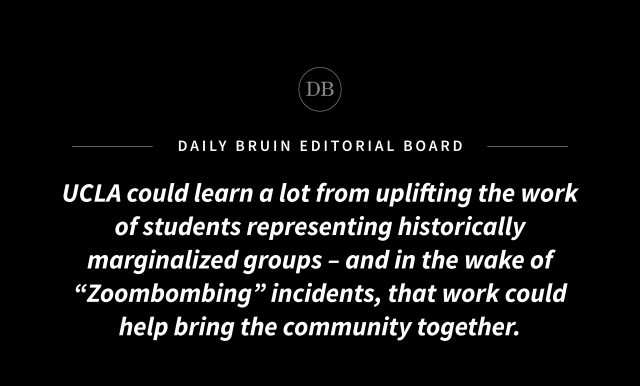Trolls don’t just live under bridges anymore – they’ve recently started showing up in Zoom lectures, too.
And the response has been clear: “Zoombombing” will not be tolerated.
Zoombombing is a type of cyberattack by which individuals hack into and interrupt Zoom calls, often using racist, crude or hateful imagery and speech. In the wake of an online-only world, these attacks have occurred at universities, elementary schools and in workplaces – at UCLA, multiple online classes have been hacked by individuals spewing racial slurs.
College students already face a turbulent transition to online education, and hateful acts like these only serve to make the web feel more unwelcoming.
At UCLA, student organizations like the Afrikan Student Union have stepped up and offered measures to condemn discriminatory speech and implement practical solutions. ASU addressed the problem Tuesday during an Undergraduate Students Association Council meeting and compiled a list of preventative tools available to teaching staff – including easy fixes like adding a meeting password – on a recent Instagram post.
ASU also provided a clear statement calling on UCLA to respond to the issue – and administrators eventually did.
In the days since, university officials met the issue head-on, working alongside law enforcement and providing support to those affected by such incidents.
Although it took some time, administrators had a commendable response to a situation on which they are no experts. In the coming months, there will be a lot the university doesn’t know – and students can help to fill that knowledge gap. Following this situation and moving forward, the administration must engage with the work of student organizations such as ASU – not by simply taking their suggestions but by providing them a platform to reach a community that is already spread thin.
Chancellor Gene Block noted Wednesday in a campuswide email that many of the Zoombombing comments were “anti-Black and anti-Semitic” in nature. That makes consulting affected student groups all the more important. Those directly affected by hate often have the best grasp on the gravitas of the issues at hand, and the university should jump at the opportunity to take their guidance.
ASU has already gone above and beyond in approaching both USAC and the administration directly. But addressing these incidents is not ASU’s responsibility – the real onus lies with UCLA.
The university’s Incident of BIAS Reporting Form is a good start in seeking student complaints, but these incidents demonstrate that there’s a great distance still to go. UCLA could learn a lot from uplifting the work of students representing historically marginalized groups – and in the wake of Zoombombing incidents, that work could help bring the community together.
Punishing those who disrupt students’ access to equal learning opportunities with racist comments is important. But so is providing a comfortable environment that facilitates learning.
Students affected by Zoombombings may feel out of place or on edge during future classes, jeopardizing their education. Including the perspectives of student organizations in the ensuing conversation will put real weight behind claims that all students are welcome and valued.
UCLA should be pulling out all the stops to ensure its campus – whether virtual or physical – provides an inclusive education for everyone.
And whatever they do to achieve that should involve the students most affected.

